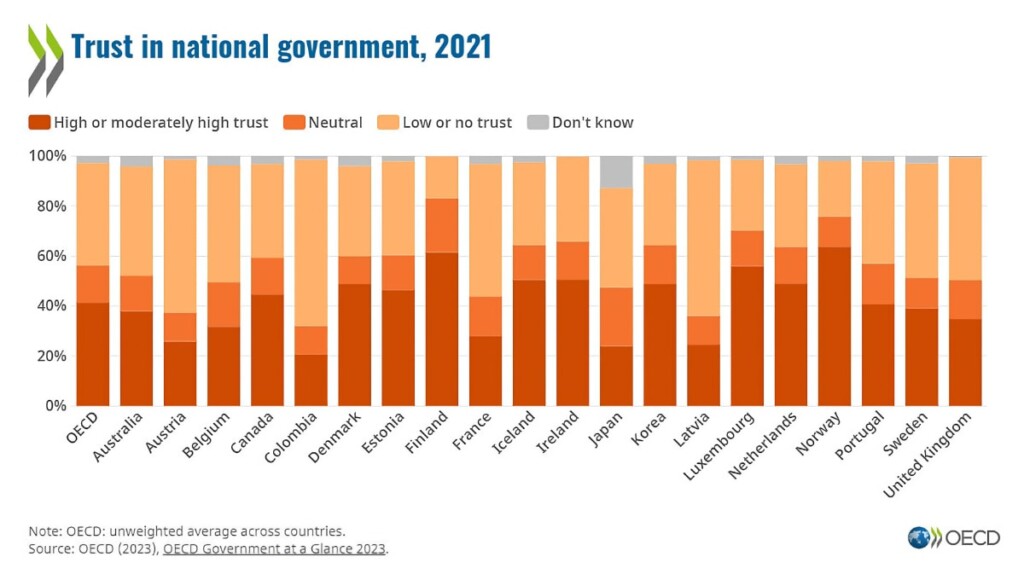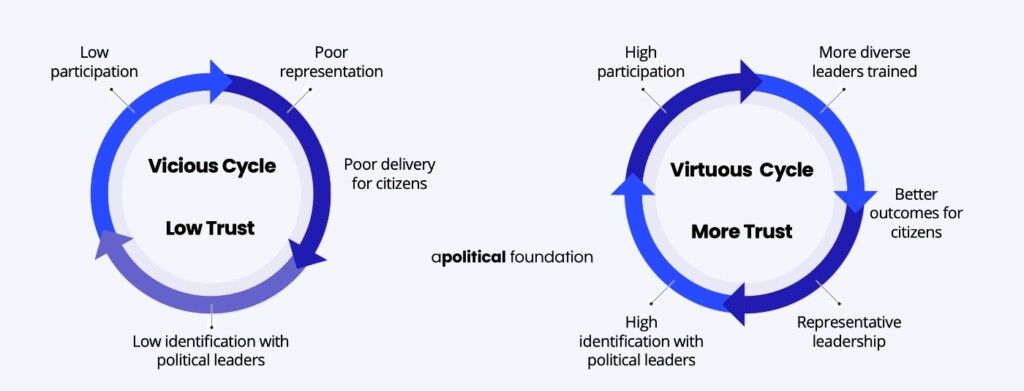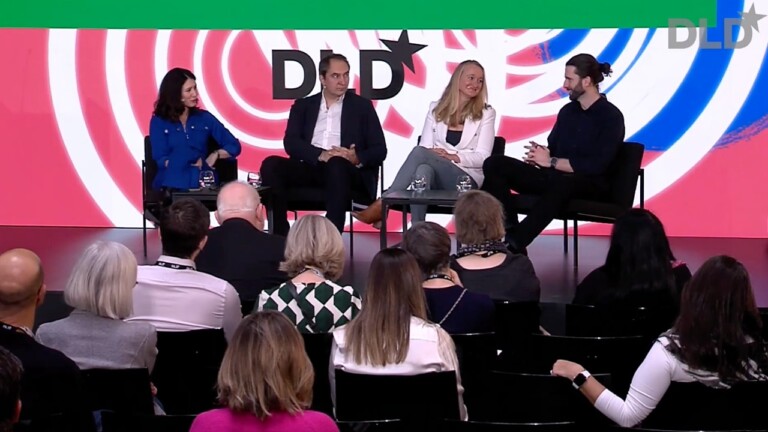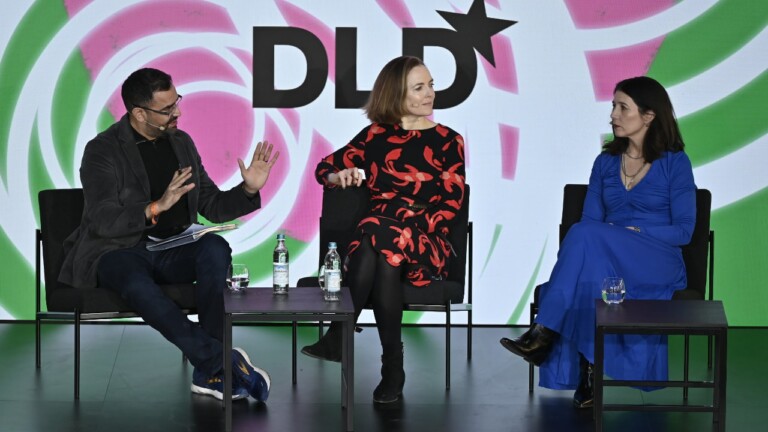
“Democracy Has a Delivery Problem”
Around the globe, billions of voters are heading to the polls this year – and many are “in a foul mood”, the news agency AP notes. As incumbents get punished, in various countries extremist parties are on the rise and surveys indicate a growing frustration with governments and the democratic process itself.
In a recent poll by the non-partisan Pew Research Center, almost three out of four voters said they believed that “elected officials don’t care what people like them think”, and 42% felt that no party in their country represents their views. The OECD presents similar findings, reporting that “only 30% of people feel they can have a voice on what the government does.” Meanwhile, most people trust businesses far more than their elected government leaders, the Edelman Trust Barometer shows.
To Lisa Witter, these recent trends indicate that liberal democracies are struggling to keep up with rapidly changing societies. As Co-founder of Apolitical, a global platform for policymakers, Witter is trying to give governments and administrations around the world an upgrade for the digital age – through education, upskilling and citizen involvement.

Room for improvement: In most OECD countries, not even half the population shows “high or moderately high” trust in government, the organization says in its report Government at a Glance 2023.
In conversation with DLD, Witter explains why valuing democracy goes beyond casting a vote on election day; how agile governance can modernize the state; and what innovators from business should consider when entering politics.
Are Western democracies in trouble?
Yes, I believe so. Statistics show that many people – particularly young people – would be okay with having autocratic leaders. And we do see different candidates around the world call for undemocratic measures. So I’m not being partisan here. I really do think that democracy is under threat.
How do you explain this trend?
Understanding the evolution of democracy and the rise and fall of civilizations can be fascinating. There’s a theory that societies progress from bondage to struggle, struggle to freedom, freedom to abundance, abundance to apathy, and finally, apathy back to bondage.
I sometimes worry that we might be in the abundance-to-apathy phase, especially in many Western societies where a high standard of living is common. But despite the general abundance, many people feel left out. They fear for their jobs, their financial well-being, their future. And they feel that democracy isn’t delivering for them.
I often hear people say, “What has democracy done for me and our country?” In that sense, democracy has a communications problem and a delivery problem.

Lisa Witter is the Co-founder of Apolitical, a B-Corporation and the largest global learning platform for government, with over 250,000 members. Apolitical connects public servants to the latest ideas and skills and partners to transform government. Witter is also the co-founder and CEO of the Apolitical Foundation, a non-partisan charitable social business dedicated to revitalizing democracy by updating political leadership for the 21st century.
Has technology poisoned the democratic discourse?
It certainly plays a role. When the Internet came out we were really excited about the democratization of ideas and access. But we’ve seen it become the land of trolls and a lot of hate. It is now normal to say that all politicians are horrible or that we should just get rid of all politicians. Even smart, normally level-headed people rage against politicians and make sweeping statements of a kind that you would never hear about business leaders.
In addition, technology has made our lives more complex. We all used to consume more or less the same news through various channels, but now it’s global and 24/7. You can always tap into a never-ending information stream. And what we know about complexity is that it literally hurts the brain. It reduces our decision-making. It makes us tired. As a result, we’re facing both an attention crisis and a complexity crisis.
How does this dynamic create so much negativity?
The digital economy has increasingly focused on customer-centric design, tailoring websites and services specifically for individual users. This approach is driven by the need for clicks and purchases to ensure company success.
But democracies aren’t an individual pursuit. They’re really a local, national and even global effort. They’re also about building communities. Apolitical, our company, is a peer-to-peer learning platform for government. It’s the largest network of public servants in the world.
When we built the company we thought people would come looking for the best policy ideas. And we found out that the first thing they wanted was to find each other and really build community.
We now see a movement in technology to balance customer-centric design with community-centered design. Although it’s in the early stages, there’s growing optimism that by considering individual and community needs, we can use technology to combat loneliness and foster stronger connections.

Trust cycle: Many factors come together, strengthening – or weakening – the democratic process, as the Apolitical Foundation explains in its report Better Leaders, Better Democracies.
Still, we’re seeing more and more violence against politicians. What effect does this have on democracy?
People who run for public office are incredibly brave and courageous. Think about it – who wants to go into politics when 80% of female politicians face threats? A dear friend of mine, Jo Cox, was tragically murdered for her political work, and her dedication drives much of what I do today.
It’s unacceptable for anyone to face threats because they work in politics, and we all need to stand against this. I have immense respect for those ethically working in politics today. It may not always seem glamorous, but it is vital and inspiring work. We must change the norms that threats and violence are normal and accepted – and we can.

Lisa Witter
Co-founder Apolitical
“Democracy is hard fought and quickly lost if we’re not careful. We should all help protect it.”
What will it take to strengthen democracy again?
One of the challenges we have is that most people think democracy means casting a vote in elections. But elections are just one part of democracy. Setting agendas, participating in parties, engaging in the legislative process, running for office, or supporting good candidates are all crucial.
So there’s one clear course of action: get more involved. Befriend and sincerely listen to those with different perspectives to bridge divides and work collectively.
I understand that life can be hectic, but involvement in democracy doesn’t always require a considerable time commitment. Even small actions can make a big difference.
The average person spends almost 2 hours and 24 minutes on social media every day, watching memes, videos or aimlessly scrolling through their news feeds. Imagine redirecting just a fraction of that time to make a difference in our democracy!
Democracy is hard fought and quickly lost if we’re not careful. We should all help protect it with active participation and collective effort.
What do you tell people who feel that government is a burden on taxpayers?
When people say the government is too big, too slow, perhaps even unnecessary, I understand their frustration, but this view can be overly simplistic. Consider air travel: when a Boeing jet lost a door shortly after take-off, everyone blamed the regulators, asking, “How could this happen?” This highlights the crucial role of government oversight, even as we push for smaller budgets.
The reality is, we want well-regulated, safe services, but also demand a leaner government. It’s a balancing act. Effective regulation and safety require sufficient resources and expert personnel.

Lisa Witter
Co-founder Apolitical
“Talent is crucial. While technology and business conferences emphasize talent, government and politics often overlook talent development.”
True. But how big does government need to be?
It’s not just about the size of the government but about its effectiveness. Some early research shows that trust in government increases with more frequent communication with citizens, even if the communication isn’t perfect. This is promising. At Apolitical, we aim to help governments enter the modern age by focusing on the mindset and skills of government employees.
Talent is crucial. While technology and business conferences emphasize talent, government and politics often overlook talent development. That’s why we focus on upskilling public servants on issues like AI and climate. For example, our Government Climate Campus program is upskilling 50,000 public servants on addressing climate in their work.
Additionally, the right mindset is essential. My work with the World Economic Forum on agile governance – concepts like “test, adapt, co-create” – is about bringing these ideas into government. We need a government that’s efficient and effective, leveraging technology and modern practices to better serve the public.
Who’s done a good job at making government agencies more agile?
Estonia’s e-Governance model allows citizens to access public services online, significantly improving efficiency. Singapore’s Smart Nation initiative integrates digital technology across the public sector. The U.K. has implemented agile practices in its Government Digital Service (GDS), leading to more user-centered public services. Japan’s Society 5.0 initiative aims to create a super-smart society through the integration of physical and virtual spaces.
These examples show how agile governance can lead to substantial improvements, but the transition requires time, understanding and respect for existing efforts.
However, one challenge is the influx of passionate outsiders who push new ideas without respecting the complexities of governance, politics, and stakeholder management. This is common in the private sector, where business leaders run for office thinking they can easily fix things.
What’s wrong with this attitude?
Once inside, they realize it’s not as simple as they thought. The first question should be, “How might we help you?” instead of assuming, “We know better than you!” Implementing radical changes is complicated for a reason. We have laws to slow things down, because the government’s role is to protect everyone. It’s meant to be deliberate, considering all stakeholders.
To bridge the gap between business and government, the Apolitical Foundation offer programs like “Be a Politician for a Day” and “Government 101 Boot Camp.” These initiatives help the private sector understand the complexities and opportunities in modernizing government for the 21st century.

Lisa Witter
Co-founder Apolitical
“Digital technologies like AI can help streamline processes, reduce costs and improve decision-making, ensuring that government is not just smaller but smarter and more effective.”
We live in an age that seems to be speeding up relentlessly. How can government keep up?
Digital technologies like AI can help streamline processes, reduce costs and improve decision-making, ensuring that government is not just smaller but smarter and more effective. They also play a role in automating routine tasks, improving data analysis and enhancing service delivery, as we describe in our Apolitical Quarterly Insights. Ultimately, rather than seeing the government as a burden, we should focus on optimizing its size and leveraging technology to serve better and protect our communities.
What trends do you see that give you hope?
There are extraordinary people in politics. I’ve had the honor of serving with many of them and supporting them. Last year, in a report called Better Leaders, Better Democracies, we mapped the entire world of what’s going on to bring different, transformational folks into politics and to support the good people who are in the system already.
And what I am seeing, from Nigeria to Argentina, to the Arctic, to Bangladesh, is that there are entrepreneurs saying, “Technology is great, but if we don’t have democracy, I don’t care about the technology.” We’re seeing indigenous people saying, “We need to go in and actually have power from our community.” We’re seeing activists saying, “There are limits to protest. We have to go in and be productive.”
So I have much hope from people aged 22 to 75 saying, “We’re going to bring new and different ideas with humility and grace and philosophy grounded in first principles.” And that’s what we do at the Apolitical Foundation is, we try to bring those people together.
Related DLD Videos

The Rise of Political Entrepreneurs & Innovators in Europe
